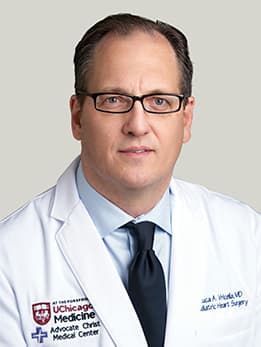
UChicago Medicine Faculty Physicians
Luca Vricella, MD
Luca Vricella, MD
UChicago Medicine Faculty Physicians
Professor of Surgery
Chief, Pediatric Cardiac Surgery
Specialties
- Pediatric Cardiac Surgery
Locations
- Chicago - Comer Children's Hospital
- Specialties & Areas of Expertise
- Locations & Patient Information
- Education & Research
- Accepted Insurance
- External Professional Relationships
Specialties
Areas of Expertise
- Neonatal Cardiac Surgery
- Aortic Surgery
- Ventricular Assist Devices (VADs)
- Heart Transplant
- Mixed Connective Tissue Disorders
- Aortic Aneurysms
Board Certifications
- Congenital Cardiac Surgery
- Thoracic Surgery
Languages Spoken
- English
- Italian
Medical Education
- Catholic University of the Sacred Heart
Internship
- Western Pennsylvania Hospital
Residency
- George Washington University Medical Center
Fellowship
- Stanford University Hospital
News & Research
Insurance
- Aetna Better Health *see insurance page
- Aetna HMO (specialists only)
- Aetna Medicare Advantage HMO & PPO
- Aetna POS
- Aetna PPO
- BCBS Blue Precision HMO (specialists only)
- BCBS HMO (HMOI) (specialists only)
- BCBS Medicare Advantage HMO & PPO
- BCBS PPO
- Cigna HMO
- Cigna POS
- Cigna PPO
- CountyCare *see insurance page
- Humana Medicare Advantage Choice PPO
- Humana Medicare Advantage Gold Choice PFFS
- Humana Medicare Advantage Gold Plus HMO
- Medicare
- Multiplan PPO
- PHCS PPO
- United Choice Plus POS/PPO
- United Choice HMO (specialists only)
- United Options (PPO)
- United Select (HMO & EPO) (specialists only)
- United W500 Emergent Wrap
- University of Chicago Health Plan (UCHP)
Our list of accepted insurance providers is subject to change at any time. You should contact your insurance company to confirm UChicago Medicine participates in their network before scheduling your appointment. If you have questions regarding your insurance benefits at UChicago Medicine, please contact our financial counseling team at OPSFinancialCounseling@uchospitals.edu.
UChicago Medicine is committed to fostering a corporate culture of ethical behavior and integrity in all matters related to compliance with the laws and regulations that govern the delivery of healthcare. This aspiration is central to supporting patient care, research, and teaching at UChicago Medicine.
Some of our physicians and health professionals collaborate with external pharmaceutical, medical device, or other medical related entities to develop new treatments and products to improve clinical outcomes for patients. In some instances, the physician has ownership interests in the external entity and/or is compensated for advising or speaking about the entity’s products or treatments. These payments may include compensation for consulting and speaking engagements, equity, and/or royalties for products invented by our physicians. To assure objectivity and integrity in patient care, UChicago Medicine requires all physicians and health professionals to report their relationships and financial interests with external entities on an annual basis. This information is used to review relationships and transactions that might give rise to potential financial conflicts of interest, and when considered to be significant a management plan to mitigate any biases is created.
If you are a patient at UChicago Medicine and would like more information about your physician’s external relationships, please talk with your physician. You may also visit the Centers for Medicare & Medicaid Services (CMS) Open Payments website at https://openpaymentsdata.cms.gov/ . CMS Open Payments is a national disclosure program that promotes a more transparent and accountable health care system. It houses a publicly accessible database of payments that reporting entities, including drug and medical device companies, make to covered recipients like physicians and hospitals.
Information in the CMS Open Payments database could potentially contain inaccurately reported and out of date payment information. All information is open to personal interpretation, if there are questions about the data, patients and their advocates should speak directly to their health care provider for a better understanding.
Some of our physicians and health professionals collaborate with external pharmaceutical, medical device, or other medical related entities to develop new treatments and products to improve clinical outcomes for patients. In some instances, the physician has ownership interests in the external entity and/or is compensated for advising or speaking about the entity’s products or treatments. These payments may include compensation for consulting and speaking engagements, equity, and/or royalties for products invented by our physicians. To assure objectivity and integrity in patient care, UChicago Medicine requires all physicians and health professionals to report their relationships and financial interests with external entities on an annual basis. This information is used to review relationships and transactions that might give rise to potential financial conflicts of interest, and when considered to be significant a management plan to mitigate any biases is created.
If you are a patient at UChicago Medicine and would like more information about your physician’s external relationships, please talk with your physician. You may also visit the Centers for Medicare & Medicaid Services (CMS) Open Payments website at https://openpaymentsdata.cms.gov/ . CMS Open Payments is a national disclosure program that promotes a more transparent and accountable health care system. It houses a publicly accessible database of payments that reporting entities, including drug and medical device companies, make to covered recipients like physicians and hospitals.
Information in the CMS Open Payments database could potentially contain inaccurately reported and out of date payment information. All information is open to personal interpretation, if there are questions about the data, patients and their advocates should speak directly to their health care provider for a better understanding.
